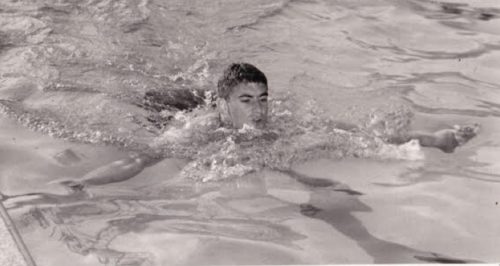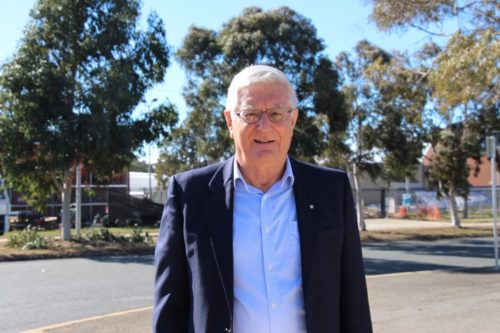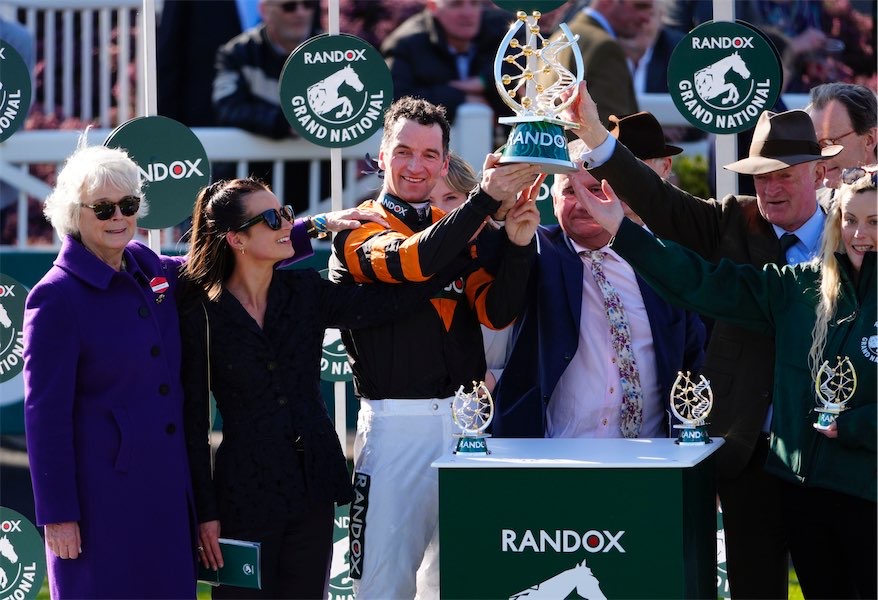
Gary Stutsel is 80 and recently won 10 gold medals for swimming, all in record time. DANIELLE NOHRA has the story…
AT the age of 80, Turner resident Gary Stutsel is still breaking records in swimming, and recently competed in the Great Barrier Reef Masters Games where he won 10 gold medals, all in record time.
Gary was 13, though, when he won his first race in his home city, Sydney, but says it wasn’t until he was 49 when he swam his fastest time in the 100-metre breaststroke event.
These days, he mostly swims for fun but was a real contender when he was swimming competitively.
He even almost qualified for the 1960 Olympic Games after coming third at the trials, but says he missed out because of changes to the structure of the Games.
He says the butterfly and breaststroke were separated following the 1956 games, meaning only two people from each country were chosen for each stroke, not three.

“It didn’t devastate me but it was a bit of a setback,” says Gary, who stopped competitively swimming at 22 to work full-time as a pharmacist.
“I kept swimming with a social club though, which held races, until I was 35.”
Even though Gary’s Olympic swimming dreams never came true, he kept swimming and was a key player in setting up the Masters Swimming Australia Association, which has clubs in Canberra where Gary now swims.
He’s also the treasurer of the Molonglo Water Dragons, a Masters Swimming club, but his involvement with Masters Swimming goes back to its beginning.
Gary was living in Sydney in 1974 when a group of 45 US Masters swimmers came to compete.
“In this competition I won the breaststroke in the 35-to-39 age group and came second in freestyle after being narrowly beaten by John Henricks, who was the 1956 Olympic gold medallist,” he says.
“But what I was really impressed by was the fairness of the five-year age groups in all strokes and distances, and by how women and men were swimming together.”
After the competition Gary joined a group of eight men and two women, with an objective to form a regular Masters championship in Australia and adopted the name, Australian Masters Swimming Association (AMSA).
“Up until then there were three men’s groups who were mostly social swimmers but had their own annual competitions,” he says.
“There was nothing in the ACT at the time and there was a mixed competition in SA.”
The idea behind AMSA was that it would hold a competition every year, which would be open to everyone, something Gary says is still a value to this day.
“In the beginning it was about competition whereas now it’s about the training and socialising though,” he says.
But before it got to this stage, there was still plenty of work to be done and not long after establishing the association Gary got the idea they should formalise what they were doing so he drafted a national constitution and a NSW constitution.
This new structure became the governing body of branches in each state, with Gary being the first national secretary, which was then an unpaid volunteer role.
Over the years Gary’s seen an increase in the number of swimmers through the club and he’s also seen an increase in women swimming with the club.
“At the first competition there was probably about 80 per cent males, now 51 per cent are females and 49 per cent are males,” he says.
Here in Canberra, where Gary’s been for about 11 years, he says it had its own body for years but now, it’s part of NSW.
“That was because ACT swimmers wanted to compete in NSW competitions,” he says.
According to Gary, there are currently three Canberra Masters clubs in the ACT but he believes there is a big opening for more of these cubs here.
Personally, Gary swims in all of the pools tied to the Canberra Masters clubs, saying he gets to one of them about three times a week because he loves the physical and mental benefits from staying active.
“I hope to keep swimming for as long as I can still get to the pool,” he says.
Who can be trusted?
In a world of spin and confusion, there’s never been a more important time to support independent journalism in Canberra.
If you trust our work online and want to enforce the power of independent voices, I invite you to make a small contribution.
Every dollar of support is invested back into our journalism to help keep citynews.com.au strong and free.
Thank you,
Ian Meikle, editor









Leave a Reply